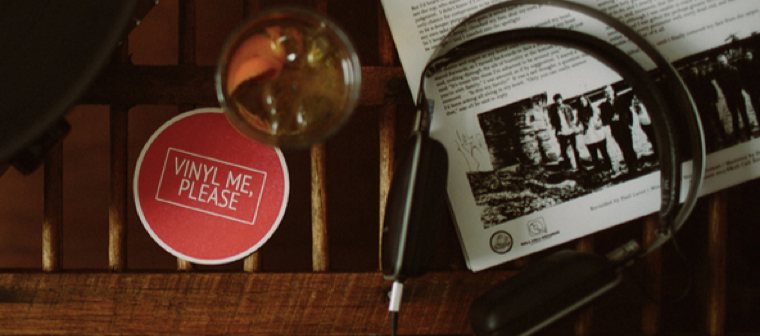When Matt Fiedler received his dad’s old turntable for Christmas a few years ago, his relationship with music recordings on vinyl was love at first listen. Almost immediately, he and a friend, Tyler Barstow, began haunting Chicago record stores in search of “collection must haves.” The only problem was: There was so much to choose from, they often were overwhelmed and left empty-handed. With this, they began talking about Columbia House, the old mail-order record division of Columbia Records, and wondered why no one was doing it today. Which is when, as happens lots before businesses start, the lighting bolt of inspiration struck: “Hey…why don’t we start a record of the month club?” So they did–and dubbed it Vinyl Me, Please.
![]()
Since founding the company in 2012, the business has discovered a large and growing community of customers who love vinyl recordings as much as Matt and Tyler. But their journey to success has included bumps along the way. Fortunately, the two turned to advisors whenever they hit a challenge, reaching out to friends, family members, acquaintances and business owners they hadn’t yet met, but whom they thought may help them with some specific insight or opinion.
In other words, they developed a network of mentors: people could provide them some guidance or advice or wisdom-from-experience that could them navigate a tough spot or challenging decision.
With a newly-found appreciation for the role of mentors in the creation and growth of a business, Matt and fellow company partner (there are four) Severan Johnson, discussed with us how mentors helped them and Vinyl Me, Please along the way.
You guys are big on having mentors and, now, mentoring others. Why?
Mentors offer two primary things: experience and perspective. For us, as first-time entrepreneurs, we need all the help we can get. We realized very early on that we couldn’t do this ourselves and that there are people who have a ton of experience who are willing to help if we would just ask. When you have people you can go to and ask for advice, it allows you to learn things much quicker. Rather than wasting time doing research or going down the wrong path, mentors can usually help steer you in the right direction. Mentors are also the kinds of people you can go to for unbiased opinion when you’re wrestling with something. They are not typically ingrained in the same day-to-day as you so they’re able to offer an alternative perspective on whatever issue you’re dealing with. You may not always walk away with a clear answer to your problem, but you’re much better for having talked it through.
Did you have mentors when you started out?
Yeah, we had a few close friends and family members who acted as mentors and helped us get VMP off the ground. They were people within our immediate network who had had success in starting their own businesses. I don’t know that we ever would have actually started our business if it wasn’t for those people.

How did they help you and, eventually, Vinyl Me, Please?
First, they helped us understand the ins and outs of starting a business. They asked the really tough questions and forced us to think through our product, practice and refine our pitch, and even offered to pay for some small things to help us get off the ground. Probably the most important thing they offered, however, was the dose of courage and support we needed to actually get started. Starting a business is easily one of the most frightening things a person can do. Aside from the risk associated, it’s always much more of a personal battle than anything. Your business is ultimately an extension of who you are as a person and putting that out for the world to see can be awfully intimidating.
Our business was merely an idea for six months before we built up enough courage to actually try and do it. Our group of friends/mentors helped us realize the opportunity and allowed us to understand that people were going to judge us no matter what, but that we were better off trying than not. Through that experience we learned the value of having mentors, whether they be friends, family, or other entrepreneurs. It helped us understand that this was going to be a struggle and there were tons of people out there willing to help if we were willing to ask. Misery loves and also needs company sometimes, I guess.

What do you think is the biggest benefit of having a mentor (or mentors)?
Mentors are hugely valuable because of the personal relationship you have with them. Ideally, they care about you as a person, almost more so than your business. A good mentor will be able to call you out on things, but also help you talk through things. Having mentors has helped all of us work through whatever issues we’re dealing with, whether it’s work related or personal. It brings in an outside perspective and forces us to look at it through a different lens. A few of us mentor others well which keeps us humble and helps remind us of the fundamentals of what it takes to succeed.
How do you find mentors?
We typically start with a question and/or problem we’re dealing with then find a few people who we think have the expertise to help us. We use that to initiate a conversation with those people and then keep it going with follow-up questions. Through those conversations we’re able to establish a relationship of some kind. In any case, we always thank them for their time and usually end up sending them a record or something, as well.
Any suggestions for other small business owners about finding mentors?
Probably starting with what kind of advice or guidance you’re looking for and then finding people who you think can help. They don’t have to be in your network, but that’s usually a good place to start. From there, it’s a matter of reaching out. While you’re obviously free to cold call or email, the best way to get connected is to be introduced via a mutual connection. Start with a simple question by asking them about their experience(s). Keep them engaged with follow up questions and always make sure to thank them for their time. Don’t be afraid to get to know them…ask them about themselves, too.
What’s the biggest mistake you’ve seen people make with mentors?
You have to be proactive in seeking out a mentor and engaging them for advice. The relationship has to work both ways–you have to put yourself out there, and the mentor has to take the time to listen and offer advice. It’s hard to have a good experience when you have one without the other (or neither).
What’s some of the best advice you’ve received from mentors?
Probably the idea that there’s usually a third way to do something. While most people look at a problem as “either/or”, there is a third option: “both/and.” It combines the ideas and potential solutions to come up with an optimal path that requires less compromise and results in more of a “win/win.” Obviously that’s way easier said than done, but the ability to identify those solutions and act accordingly is what makes great leaders great. Another useful tip is, “suit up and show up.” So many problems we face can be solved by just showing up, full capacity, ready to go. Ready to take responsibility, ready to work the long hours, ready to do what it takes.
Would you suggest mentoring to other small business owners?
No question. For all the reasons we’ve said. But it takes work. A good mentor/mentee relationship doesn’t just happen. You both have to be invested and you have to be willing to be open and honest with one another. The power of this relationship extends way beyond getting advice. It will help you develop and grow as a person, as well as help your business in the long run.
